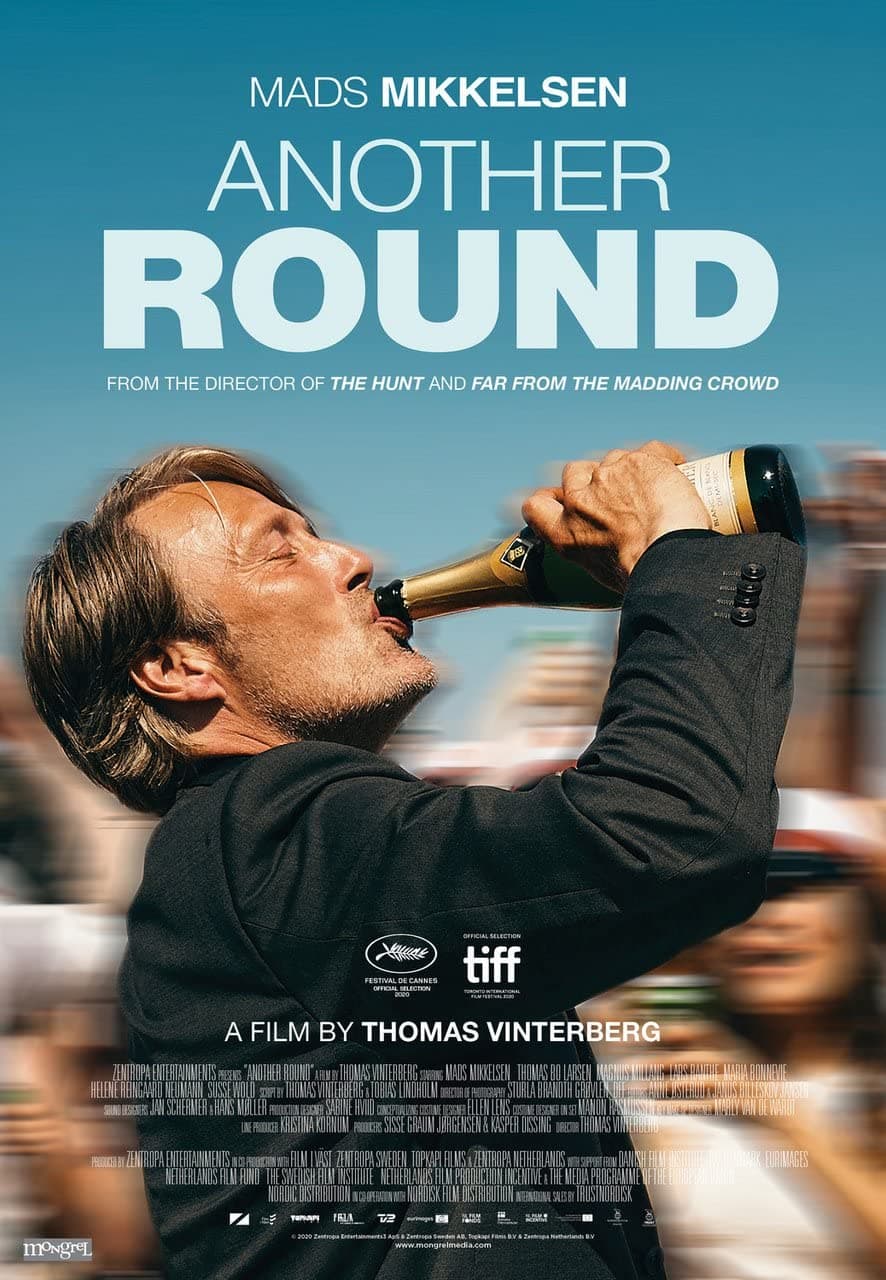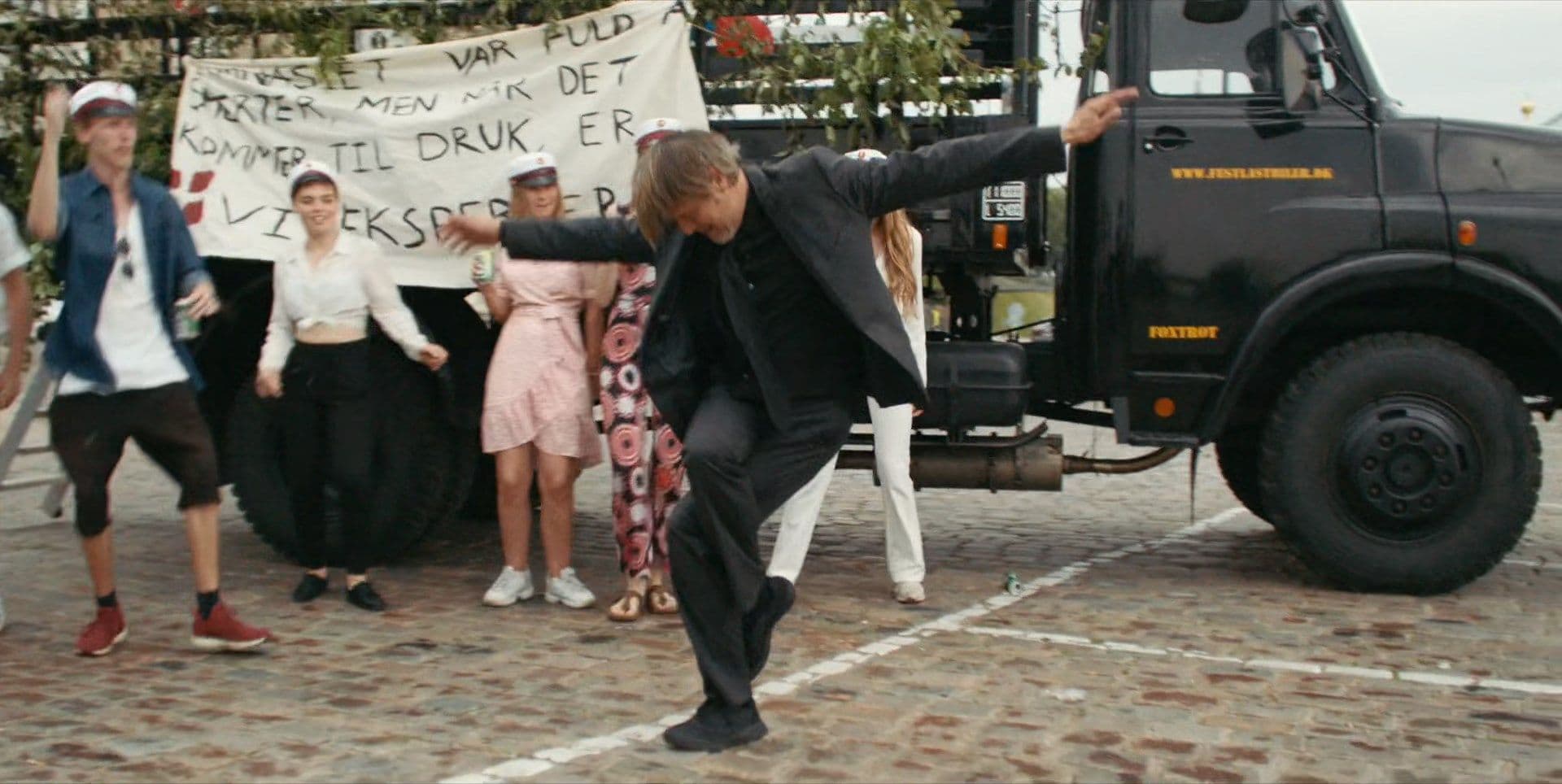
Another Round
2020
Rate this movie
Average: 4.50 / 5
(2 votes)
Director
Underneath the polished and enviable surface of the Scandinavian welfare state, a silent anguish lurks, an existential ennui that no design house or efficient school system seems able to cure. Thomas Vinterberg, with Another Round (original title Druk, "Drunk"), plunges his scalpel precisely into this wound, extracting a tragicomedy of rare intelligence, as exhilarating as it is desolating. The film is an unforgiving portrait of four middle-aged men attempting to cure their ailing souls with a brilliant yet pathetic pseudo-scientific escape route: controlled-dosage alcoholism. The four protagonists—Martin (a monumental Mads Mikkelsen), Tommy, Peter, and Nikolaj—are friends and colleagues, teachers at a Danish high school. Their lives are a swamp of routine, apathy, and broken dreams. Martin, in particular, is a ghost: his students mock him, his children ignore him, his marriage is a wreck. The idea, proposed by Nikolaj, is as mad as it is seductive: to test the theory of philosopher and psychiatrist Finn Skårderud, who postulates that humans are born with a 0.05‰ alcohol deficit in their blood. Maintaining this constant level, they theorize, will make them more brilliant, uninhibited, and alive.
Thus begins an experiment that is, in reality, a desperate plea for escape. Initially, the theory works wonders. Alcohol becomes a micro-dose of charisma. Martin transforms into a captivating teacher, reconnects with his wife, and starts smiling again. The four friends rediscover a euphoric complicity, a male camaraderie invigorated by their shared secret and daytime binges. Here, the film is caustic in suggesting that the best version of these men—and by extension, of our performative society—is only achievable through chemical anesthesia. Their artificial rebirth is the most ferocious critique of the normalcy that has dulled them. But escape is by its nature temporary. The "scientific research" inevitably transforms into an uncontrolled escalation. The line between 0.05‰ and disruptive drunkenness is crossed with predictable speed. The return to reality is brutal and fragmented: marriages definitively collapse, careers are jeopardized, and, in the case of the group's most fragile member, Tommy, a descent into pure alcoholism culminates in tragedy. The friendship that united them in the experiment proves powerless in the face of the chaos they unleashed. Reality cannot be deceived for long, and it presents a very steep bill.
Another Round is the mature expression of Danish cinema, which has made the dissection of bourgeois neuroses its trademark. To fully understand Vinterberg, one must return to his starting point: Dogma 95. Founded with Lars von Trier, that movement was a cinematic puritanism, a "vow of chastity" that imposed strict rules (hand-held camera, natural light, no extradiegetic music) to strip cinema of all artifice and achieve a raw emotional truth. The first Dogma film, Vinterberg's The Celebration (Festen - Festa in famiglia, 1998), is a masterpiece of psychological brutality, a frontal attack on family hypocrisy shot with the raw precision of a documentary. If The Celebration was a scream, Another Round is a complex discourse, at times whispered, at times screamed, and finally danced. Vinterberg has long abandoned the corset of Dogma, but he has internalized its fundamental lesson: the primacy of acting performance and emotional truth. Films like The Hunt (Jagten, 2012) already show him in a post-Dogma phase: a more classic narrative, meticulous cinematography, but the same interest in the social pressure that crushes the individual.
Another Round represents the perfect synthesis of his journey. It possesses the social critique and psychological tension of The Celebration, but expresses them with a total mastery of cinematic language. He uses music to create atmosphere, cinematography to highlight euphoria and melancholy, and culminates in one of the most memorable and anti-Dogma scenes imaginable: Martin's liberating and desperate dance. That dance, an explosion of grace and chaos, is proof of a director who has achieved total expressive freedom, capable of finding truth not only in raw realism but also in a moment of pure and cathartic cinematic transcendence. Furthermore, this film is imbued with a tragic and personal dimension (the death of the director's daughter at the beginning of filming), which elevates it from a simple apologue on alcohol to a celebration of life, with all its imperfection, its pain, and its irrepressible, mad vitality.
In conclusion, Another Round is not a moralistic film for or against alcohol. It is a deeply ambiguous work about accepting one's own mediocrity and the necessity, at times, of risking losing control to feel alive again. Martin's final dance is not an answer. It is a question. Is it a momentary triumph or the last, magnificent spasm before the definitive collapse? Vinterberg, with caustic brilliance, leaves us with this doubt, suspended like his protagonist in a mid-air leap between joy and the abyss.
Countries
Gallery




Featured Videos
Official Trailer
Memorable Scene
Comments
Loading comments...